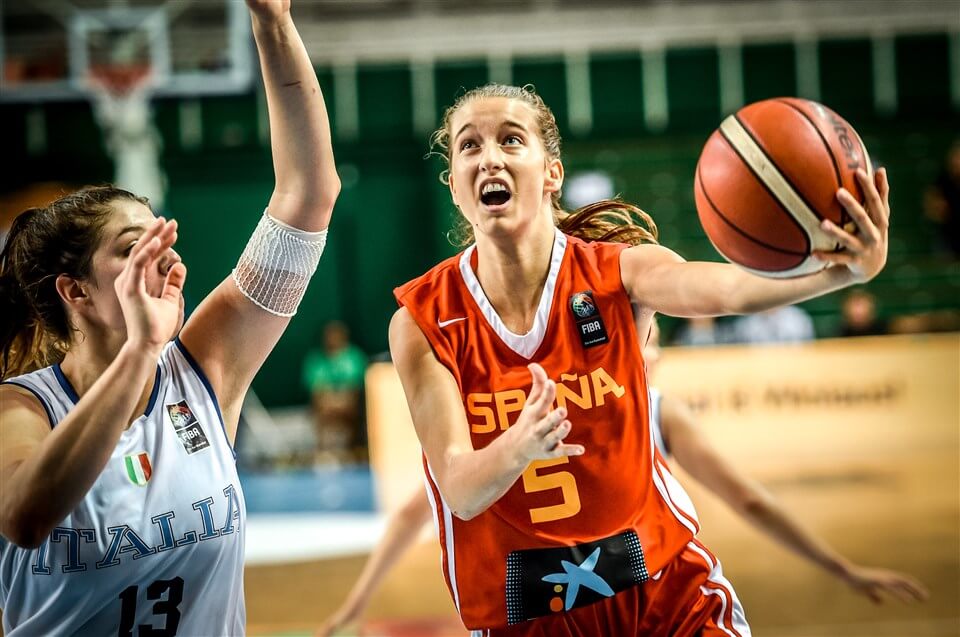Paris, France — CFBB, or Centre Federal, is French Federation’s 3 year long elite program for its U15-U18 prospects. Each year 10-12 of the best players of each generation are selected and gathered in Paris for 3 years at the INSEP facility (National Sport Institute) where they are provided with optimum conditions to live, study, practice and compete. FFBB invests around 40,000€ (46,000$) per year per player for this to be possible. This is how France fuels its various NT with a permanent inflow of new prospects and why they usually fare well in international competitions. When the players finish their curriculum they sign with professional clubs that pay the Federation a certain share in return.
After years of rare CFBB’s players joining NCAA programs, last significant one being Diandra Tchatchouang (Maryland ‘09-’11), their number has suddenly gone from zero to 7 in just two seasons, this among CFBB’s class of ’16 and ’17 alone and includes the likes of:
Maria Guramare (Harvard)
Sabrina Piper (Siena)
📸 | 2017-18 Siena Women's Basketball Photo Day. FULL GALLERY → https://t.co/WT4ehs7p4e #SienaSaints #MAACHoops pic.twitter.com/moWB6a7KQO
— Siena Women’s Basketball (@Siena_WBB) October 11, 2017
Amandine Toi (Virginia)
@amandine_toi stars in today's #WahooWednesday! Amandine's top picks: 🚙Lamborghini🌮Continental Divide 💪Wonder Woman📺Power 🏀Kobe 🥅Real Madrid pic.twitter.com/3zRsrPnXnk
— Virginia Women's Basketball (@UVAWomensHoops) November 1, 2017
Marie-Paule Fopossi (Syracuse)
Meet Marie-Paule Foppossi! Foppossi served as a captain for the 2017 French U19 and U20 national teams. 🍊🏀 #OrangeCollar pic.twitter.com/vBkFfz7ibV
— Syracuse Women's Basketball (@CuseWBB) October 8, 2017
Maëva Djaldi-Tabdi (Syracuse)
Meet Maeva Djaldi-Tabdi! The Paris native starred for the French U19 and U20 national teams this past summer. 🍊🏀 #OrangeCollar pic.twitter.com/HUWv2XbAHn
— Syracuse Women's Basketball (@CuseWBB) October 2, 2017
Emmanuelle Tahane (Missouri)
Daphné Gnabo (Riverside)
.@UCR_WBB Adds French National Team Member Daphne Gnago For 17-18. https://t.co/SqfMuXOiFY
— Highlander Athletics (@UCR_Athletics) May 5, 2017
This number is potentially set to reach 9 next season following Kadiatou Sissoko’s (class of ’17) and Kenza Salgues’ (class of ’18) early commitments to Syracuse for 2018. To which you may also add Euro-U16 gold medalist Anaia Hoard‘s transfer to Wesleyan Christian Academy after just 1 year at CFBB.
https://twitter.com/jaael__/status/918491009021079552
That’s 8 players this season and potentially 10 next season and includes France high-profile players such as Djaldi-Tabdi, Fopossi, Tahane, Sissoko and Salgues. This recent NCAA trend is totally new to FFBB and sets a new pattern in its long-lasting organization. FFBB is now concerned about the potential negative consequences this exodus holds regarding its dued return on investment once the program is completed. FFBB has therefore decided to address the situation. President Siutat announced during a press conference on Sept 22nd that he alerted the FIBA authorities about his Federation’s difficulties to keep its prospects and is asking for coercive measures to prevent players coming out of federal structures to go stateside. He is working to sensitize other federations to his cause, none to date have spoken publicly on this matter nor has FIBA responded to this request.
While US colleges recruiting approach and cultural differences between institutions have their part, this is quite a harsh and uncompromising move from FFBB. For all the sudden the situation is and creates a shock in France and forces FFBB’s President Siutat to address the case firmly calling for clear actions, he should not forget that in the long run France and its national teams could benefit more than suffer from this situation just as it has been beneficial for the men side to have players join both the NCAA and the NBA in the early 2000’s. The return on investment could come delayed thanks to overall better NT results in major FIBA competitions leading to higher visibility and better TV/sponsors contracts. Furthermore, given the high number of players recently choosing to play and study in the NCAA it would make more sense to try to understand why players chose to leave France rather than try to simply forbid it. Maybe there is something in the US system that is lacking back in France and could also be addressed to encourage players to stay. Maybe they see the opportunity to continue playing and studying between 18 and 22 as actually really appealing and part of the solution would possibly come from creating international programs specific to athletes with specific international mobility options rather than merely implementing a ban. Some pro French players like Sandrine Gruda, Diandra Tchatchouang or Aby Gaye take part in distance learning programs created specifically for pro athletes by renowned French schools (Sciences Po, CFJ). This could set the base for new exchange programs between US colleges, FFBB and specific French schools through which players’ mobility would be facilitated, better structured and organized. Banning can not be the solution and finding a solution-driven compromise that sees all parts benefit should be everybody’s priority. Is FFBB ready for this? Are US colleges ready for this? Are players’ interests taken into account? Otherwise, as it is the case on the men side, some players might actually think twice before joining CFBB knowing it can close relevant options in their careers development. CFBB used to be the sole elite program players thrived to join, now only 70% of the best male prospects join it, others preferring more flexible club facilities to develop. Only future will tell how this situation will shape on the women’s side. In the meantime if you are planning to recruit French CFBB players, the time is rather now than later as negociations with FFBB will become tougher.
Born to Polish PE teachers/coaches parents, involvement with sport and basketball was never a question. Eastern attention to fundamentals, athleticism, discipline and hard work eventually met Western standards through his development in the French system. Now a former player with a passion for the women’s game going back for more than 25 years, he uses his knowledge to bring insights and perspective on women's basketball internationally - with a strong emphasis on Europe and player development.





